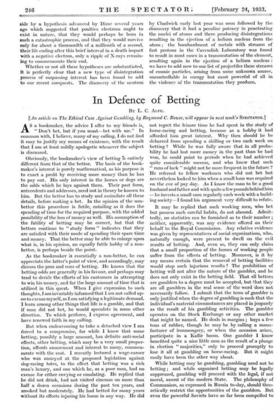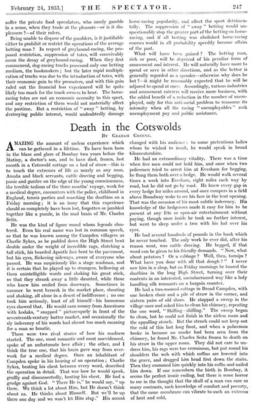In Defence of Betting
By L. C. ALPE.
[An article on The Ethical Case Against Gambling, by Raymond C. Rowse, will appear in next week's SPECTATOR.] AS a bookmaker, the advice I offer to my friends is, " Don't bet, but if you must—bet with me." In common with, I believe, many of my calling, I do not find it easy to justify my means of existence, with the result that I am at least mildly apologetic whenever the subject is discussed.
Obviously, the bookmaker's view of betting entirely different from that of the bettor. The basis of the book- maker's interest is purely mathematical, as his purpose is to exact a profit by receiving more money than he has to pay out. His only interest in the horses or dogs are the odds which he lays against them. Their past form, antecedents and addresses, need not in theory be known to him. But the bettor has to study and assimilate all these details, before making a bet. In the opinion of the non- bettor this procedure is futile, entailing as it does the spending of time for the required purpose, with the added possibility of the loss of money as well. His assumption of the futility of betting may be correct, but that the bettors continue to " study form " indicates that they are satisfied with their mode of spending their spare time and money. That the bettor may be able to enlarge upon what is, in his opinion, an equally futile hobby of a non- bettor, is perhaps beside the point.
As the bookmaker is essentially a non-bettor, he can appreciate the latter's point of view, and accordingly, may discuss the pros and cons of betting. He knows that the betting odds are generally in his favour, and perhaps may tend to deride the efforts of his customers in attempting to win his money, and for the large amount of time that is utilized in this quest. When I give expression to such thoughts, I am invariably informed that I am not called up- on to excuse myself, as I am satisfying a legitimate demand. I learn among other things that life is a gamble, and that if man did not bet, he would speculate in some other direction. To which perforce, I express agreement, and have renewed faith in my calling.
But when endeavouring to take a detached view I am forced to a compromise, for while I know that some betting, possibly a large amount, has definite anti-social effects, other betting, which may be a very small propor- tion, affords amusement and interest to many, commen- surate with the cost. I recently lectured a wage-earner who was annoyed at the proposed legislation against dog-racing totes, to the effect that betting was a rich man's luxury, and one which he, as a poor man, had no excuse for either envying or emulating. He replied that he did not drink, had not visited cinemas on more than' half a dozen occasions during the past ten years, and smoked but moderately. He bad betted for many years without its effects injuring his home in any way. He did not regret the leisure time he had spent in the study of horse-racing and betting, because as a hobby it bad afforded him great interest. Why then should he be debarred from spending a shilling or two each week on betting ? While he was fully aware that in all proba- bility he had lost more money in the past than the had won, lie could point to periods when he had achieved quite considerable success, and who knew that such " runs of luck " might not be more frequent in the future ? He referred to fellow workmen who did not bet but nevertheless looked to him when a small loan was required on the eve of pay day. As I know the man to be a good husband and father and with quite a few pounds behind him —he invests a small sum regularly each week with a build- ing society—I found his argument very difficult to refute.
It may be replied that such working men, who bet but possess such careful habits, do not abound. Admit- tedly, no statistics can be furnished as to their number ; neither, apparently, was any evidence offered on their behalf to the Royal Commission. Any relative evidence was given by representatives of social Organizations, who, naturally enough, were present to dwell on the evil results of betting. And, even so, they can only claim that a small proportion of the homes of working people suffer from the effects of betting. Moreover, is it by any means certain that the removal of betting facilities would stop such injurious results ? The prohibition of betting will not alter the nature of the gambler, and he does not only exist in the betting field. That all bettors are gamblers to a degree must be accepted, but that they are all gamblers in the real sense of the word 'does not necessarily follow. I submit that the term of gambler is only justified when the degree of gambling is such that the individual's material circumstances are placed in jeopardy as the result of his gambling activities. The gambler operates on the Stock Exchange or any other market that might be named. He deals in margins ; buys a few tons of rubber, though he may be by calling a manu- facturer of ironmongery, or when the occasion arises, participate in a Kaffir boom. One gambler I know benefited quite a nice little sum as the result of a plunge in election " majorities," only to proceed promptly to lose it all at gambling on horse-racing. But it might easily have been the other way about.
While betting may be gambling, gambling need not be betting ; and while organized betting may be legally suppressed, gambling will proceed with the legal, if not moral, assent of the modem State. The philosophy of Communism, as expressed in Russia to-day, should theo- retically restrict the opportunities of the gamblers. But even the powerful Soviets have so far been compelled to:
suffer the private food speculators, who surely gamble in a sense, when they trade at the pleasure—or is it dis- pleasure ?—of their rulers.
Being unable to dispose of the gamblers, is it justifiable either to prohibit or restrict the operations of the average betting man ? In respect of greyhound-racing, the pro- posed restriction, suppression of totes, will conceivably mean the decay of greyhound-racing. When they first commenced, dog-racing tracks possessed only one betting medium, the bookmakers ; but the later rapid multipli- cation of tracks was due to the introduction of totes, with their economic gain to the promoters, and with this gain ruled out the financial loss experienced will be quite likely too much for the track owners to bear. The horse- racing totes are not an economic necessity to this sport, and any restriction of them would not materially affect the pastime. But a restriction of " away " betting, by destroying public interest, would undoubtedly damage horse-racing popularity, and affect the sport detrimen- tally. The suppression of " away " betting would un- questionably stop the greater part of the betting on horse- racing, and if all betting was abolished horse-racing courses would in all probability speedily become affairs of the past.
What will have been gained ? The betting man, rich or poor, will be deprived of his peculiar form of amusement and interest. He will naturally have more to spend or save in other directions, and as the bettor is generally regarded as a spender—otherwise why does he .bet ?—it might be reasonably expected that he will be adjured to spend at once. Accordingly, various industries and amusement caterers will receive more business, with the added benefit of a reduction in the number of unem- ployed, only for this anti-social problem to reassume its intensity when all the racing " unemployables " seek unemployment pay and public assistance.







































 Previous page
Previous page